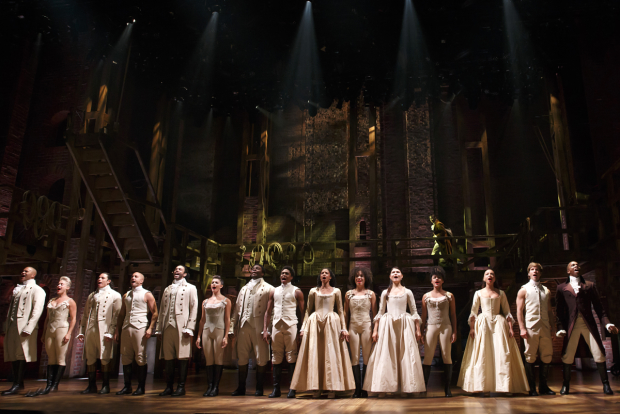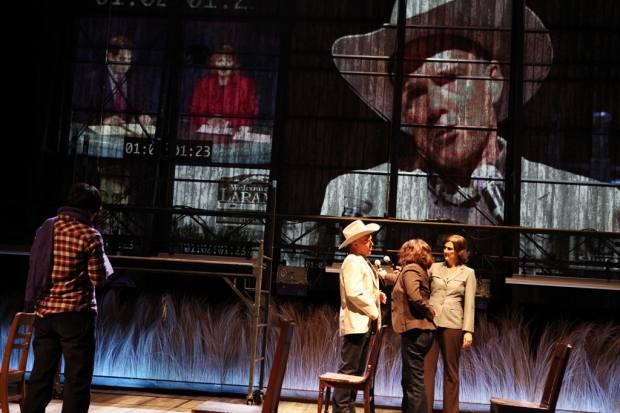How the National Endowment for the Arts Earned Their 2016 Special Tony Award
It’s all about the ”Hamilton”s — and whole lot more.

(© Joan Marcus)
August Osage County. Fun Home. Disgraced. If you love a piece of theater, there's a good chance The National Endowment for the Arts made it possible.
The NEA exists to give critical support where it will have the most benefit, keeping the arts vibrant and growing by making sure every individual in America is getting maximum artistic bang for their buck. And the endowment is pretty great at their job, most Americans would agree (certainly most Broadway ticket-buyers). After all, they also brought us Hamilton.
Well, sort of. Each year, the NEA funds Vassar & New York Stage and Film's Powerhouse Season, a summer incubator during which artists can present their works-in-progress. And in 2013, Powerhouse presented a reading of The Hamilton Mixtape, a new musical from the team of Broadway's In The Heights that would soon cut its title to a single word before premiering at The Public Theater in 2015. The rest, of course, is history.
This year, the Tony administrations committee will be celebrating the NEA's 50th birthday with a special Tony Award. "The National Endowment for the Arts' contribution to the theater community is incalculable," said Heather Hitchens, president of the American Theatre Wing, and Charlotte St. Martin, president of The Broadway League in announcing the honor. "Over the past 50 years, since its inception, the agency has funded 18 Tony Award-winning plays and 15 Tony Award-winning musicals," with many more transferring from the regions to both Broadway and off-Broadway."

(© Joan Marcus)
But for Director of Theater and Musical Theater Greg Reiner and Assistant Director for Press and Public Affairs Victoria Hutter, the work that never collects awards or receives national media attention is as exciting as the pieces of theater that make it into the country's cultural conversation. "Just as amazing are the projects we've funded that have a deep impact on their local communities," Hutter suggests. An example of one such important regional program (pinpointed among hundreds — the NEA funds at least one arts project in every single congressional district) is the Northpoint Prison Project in Burgin, Kentucky, which teaches playwriting to inmates. According to Reiner, recent studies are beginning to show that such programs are correlated with significantly lowered recidivism rates.
Of course, the results of these small, localized programs can often be felt nationally even when they don't become Broadway hits. Reiner, former founding executive director of New York City's Tectonic Theater Project, recalls a powerful comment made by Judy Shepard, mother of Matthew Shepard, a 21-year-old gay student whose death as the result of a hate crime in 1998 inspired Tectonic's play The Laramie Project.
"A couple months after we had done The Laramie Project: Ten Years Later where we'd had [our follow-up to The Laramie Project] performed in fifty states and the District of Colombia the same night the Matthew Shepard Hate Crimes Act was finally signed into law, Moisés Kaufman, who was the artistic director of Tectonic, went to the signing ceremony at the White House. And Judy Shepard turned to him afterwards and said, 'This is so wonderful that this law finally passed, but actually, The Laramie Project did more to stop anti-gay violence than a law ever will be able to.'"
Reiner agrees with Shepard, believing that theater holds unique power in giving people the chance to see the world as others see it. He points to kids in high schools where The Laramie Project is performed, who are "literally putting themselves into the shoes of a forty-year-old gay man living in Laramie, Wyoming or the man who actually killed Matthew Shepard." Those young people have the unique opportunity to "get outside of themselves" and understand "all these different points of view," explains Reiner.

(© Julieta Cervantes)
So how does the NEA manage to be so effective in so many theatrical arenas (as well, of course, as other areas of the arts including dance, design, and literature), fulfilling their mission of giving critical support where it will have the most benefit? Most important, they give consideration to how their grants can act as leverage for the theatrical community across the U.S. The organization doesn't exist, therefore, to support all the arts in the country. Instead, they strategically dole out tax-payer money where it will make the biggest difference, selecting grant recipients that illustrate artistic excellence and merit through a rigorous peer-panel review process. When it comes to the arts, Reiner says, "I can't think of anything more important to a democracy than having a democratic funding system in place."
There is an "ecosystem," Hutter echoes, which connects "the playwrights and the actors and the directors and the dramaturgs and the audiences" to one another. "I think that's so important," she continued, "that we have the federal government saying theater is important and we need to keep it healthy."
Not only does the NEA serve a purpose in our country from a practical dollars-and-cents point of view ("Look at things like Hamilton; they're generating tax revenue that's going back into the treasury," Reiner muses), the endowment has also enabled a flourishing theatrical environment in the United States that would never have otherwise existed.
"It's funny," Reiner laughs, "We're celebrating our fiftieth anniversary and at the same time I'm getting notices from theaters all around the country saying they're celebrating their fiftieth anniversaries. I don't think that's an accident."








